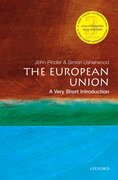
By Simon Usherwood
To the casual observer of British politics, we would appear to be heading towards a referendum on the UK’s membership of the European Union (EU). The Prime Minister has spoken for it, the clamour in the press and in the lobbies of Westminster continues to grow stronger and there is no good reason to speak against it, or so it would seem.
As with much casual observation, this is not really the case when we look more closely. David Cameron’s speech in January offered only a very minor advance, either of his previous position or even of government policy. Since the passing of the European Union Act in 2011, there has been a requirement for a referendum for any new transfer of power to the Union. The noises off by backbenchers and media commentators are as much driven by frustration as by success. With neither Labour nor the Liberal Democrats willing to match Cameron’s offer to press for a renegotiation and then a referendum, we remain where we have been for some considerable period of time.
Moreover, the entire referendum argument risks obscuring something much more consequential, namely the paucity of public debate about European integration.
To be clear, there is much more of a debate in the UK about ‘Europe’ than in most other member states. The connection elsewhere to a bigger project of political or economic modernisation, or a ‘return to Europe’, tends to take the edge off questions of the value of participating in integration, which is essentially seen as self-evident. The historical British experience of the EU — as something to be caught up with, for lack of a credible alternative — has been rather different, and so has opened a space for questioning that has long raised eyebrows in other capitals.
However, even in this relatively well-developed public debate (consider the number of times one sees an EU-related headline in the news), there is very little substance. For many in the UK, ‘Europe’ means bendy bananas, votes for prisoners (which isn’t even the EU), and not much else. By giving a byword for technocrats in Brussels making thoughtless decisions which they impose on us, we actually lose sight of what really happens. What debate there is all too often rests on little more than some half-formed ideas of what is happening, with some teasing of foreigners thrown in for good measure.

For something that both pro- and anti- sides of the debate would claim is an important part of our lives, this seems rather incredible. Instead of getting a real sense of the context and process by which decisions are made, or an understanding of the issues at hand, there is general hand-waving and appeals to higher values. Thus, any referendum is not about the Union and Britain’s part in it, but about giving the people a voice. It seems odd then that those same advocates do not press for referenda about the reform of the NHS or changes to schooling.
In the (still unlikely) event that there is a referendum, I would doubt that there will be much informed discussion. Instead we will have some headline facts and figures, together with some celebrity endorsements and a couple of half-hearted TV debates, watched by few and cared about by fewer still. Whatever the result, it would not solve any of the long-term questions about Britain’s relationship with the rest of the Continent, nor offer a constructive agenda for the future.
As both a political scientist and as a citizen, that pains me. If democracy is about anything, then it is about participation by the people. Part of that is voting, but that voting should be only one element in a bigger process of engagement, reflection, and discussion. For the EU, just as for any political issue that faces us, we should be at the front of debate, challenging those who offer to lead us to show the true value of their judgments and their abilities. If we do not, then we risk continuing the drift in policy that we served so inadequately of late, and that’s true whatever you think of the European Union.
Simon Usherwood is Senior Lecturer in the School of Politics at the University of Surrey. He is the co-author of The European Union: A Very Short Introduction. He blogs here and tweets from @Usherwood
The Very Short Introductions (VSI) series combines a small format with authoritative analysis and big ideas for hundreds of topic areas. Written by our expert authors, these books can change the way you think about the things that interest you and are the perfect introduction to subjects you previously knew nothing about. Grow your knowledge with OUPblog and the VSI series every Friday and like Very Short Introductions on Facebook.
Subscribe to the OUPblog via email or RSS.
Subscribe to only VSI articles on the OUPblog via email or RSS.
Subscribe to only politics articles on the OUPblog via email or RSS.
Image credits: David Cameron, photo by by Remy Steinegger [Creative Commons licence] via Wikimedia Commons; European Union flag, © Johan Ramberg via istockphoto.




Coming from Canada, what does the EU really do? Other than govern the Euro and monitor economic conditions.